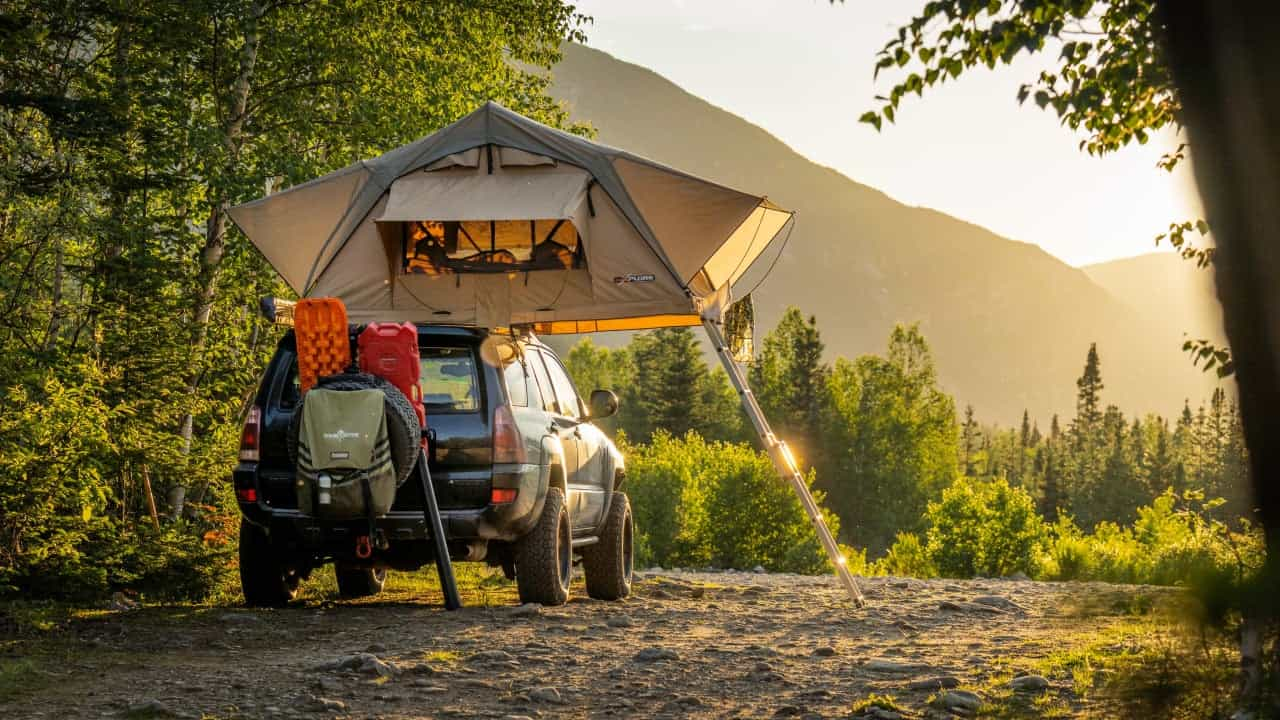Buying your first rooftop tent
If you’re looking for a cool, compact way to upgrade your road trips, a rooftop tent could be just the thing. Rooftop tents open up so many possibilities for overland adventures, but they’re also a big investment, with new tents costing anything from £750 up to several thousand pounds. Because it’s important to do your homework before going out and getting one, we’ve worked with our team of camping experts to create this guide to buying your first rooftop tent.

What is a rooftop tent?
Rooftop tents – sometimes also known as RTTs, roof tents or car camping tents – are essentially tents that are based fully or partially on top of your car. Some models are squarely based on top of the car roof, while others – as in the image at the top of this page – have a reinforced overhang to provide extra space and comfort.
Many people opt for rooftop tents for reasons that include their look, convenience and functionality – so what exactly are the benefits of rooftop tents, and can you make them work for you?

Pros and cons of rooftop tents
Rooftop tents divide opinion. While many people simply love the look and feel of their RTT, others will be put off by the practical disadvantages – and the cost – associated with getting one. We’ll leave you to make up your own mind…
Pros
-
Owners of rooftop tents often appreciate the sense of freedom they bring. If you can drive there, you can camp there.
-
Rooftop tents rarely require camping poles and guyropes, making the set-up process a lot easier.
-
Roof tents are generally very durable, with a sturdy three- or four-season construction as standard. The thick canvas most tents use is waterproof and mould-resistant and keeps out harmful UV rays.
-
Being off the ground makes it easier to keep the inside of your tent clean and insect-free. Even if it rains heavily, you’re not going to end up in a muddy bog.
- Staying above the ground makes it more likely you’ll catch a breeze in your tent – just the thing for hot summer’s nights.
Cons
-
Rooftop tents are expensive. Even the most basic rooftop tent still costs more than the very best conventional tents.
-
Having to drive to your pitch can be limiting, as not all campsites allow vehicles to park by the pitch. If you’re going cross country, your dreams of camping on the beach, on top of a mountain or right next to a lake might have to wait.
-
As you have to pitch right where you park, in some places there might be extra road noise too.
-
Rooftop tents are often very heavy. It’s rare to find models that weigh under 40 kilos, but tents can weigh significantly more than that. This means they may be difficult to load and unload from your roof, particularly if you’re travelling solo.
-
Rooftop tents are more exposed and so it can be noisy if you're trying to sleep in windy conditions.
Feel that, on balance, rooftop tents are probably not for you? Check out our tent buying guide to see what other great options are available.
Types of rooftop tent
While there are many different varieties of rooftop tent on the market today, all models basically fall into one of two categories.
Hard shell tents (pictured in the second image on this page) are essentially pop-up tents that you can pull straight out from the roof of your vehicle. As the name suggests, they are rigid constructions and often have a rather boxy appearance. They are the easiest type of rooftop tent to set up and are very durable, but they are also more expensive and have a smaller habitable area.
Soft shell tents (pictured in the first image on this page) are more similar to conventional tents and usually fold outwards to create a larger internal area. They are made from robust canvas material and so are lighter than hard shells, with the added bonus of an overhang that doubles up as an outdoor awning when the tent is pitched. While typically cheaper than hard shell tents, soft shells take longer to set up and may prove to be less durable over time.
Both hard and soft shell tents usually come with a built-in mattress, making it easy to get a good night’s sleep. If you appreciate extra back support, it may be worth spending more on a hard shell tent, as soft shell tents’ mattresses tend to be thinner (as they need to be folded in half when not in use).
Finally, before buying a particular model, check out user reviews to see how they perform in real-life conditions.

Preparing to buy a rooftop tent
Before buying a rooftop tent, we recommend factoring the following three points into your decision:
-
What kind of car do you have? Although rooftop tents come in all shapes and sizes, certain cars just aren’t suitable for them. That doesn’t mean you have to have a 4x4, but your car roof will need to be fitted with crossbars, tracks, rain gutters or similar that you can mount a purpose-built roof rack on – a bare roof is not suitable. Next, carefully check the dynamic weight capacity (i.e., how much your car can cope with carrying on the roof while moving) and the static weight capacity (how much your car can handle when it’s parked – in this case, the tent itself plus the campers inside it) to avoid potential damage to your vehicle. You can get this information on the manufacturer’s website.
-
How many people are you likely to be going camping with? It’s possible to find up to four-person or even five-person roof tents, but that doesn’t account for all your camping gear, which you may have to end up storing in the car. While rooftop tents make a great choice for couples and solo travellers, there’s nothing to stop you bringing your kids or dogs along for the ride – as long as they’re happy climbing/being carried up the ladder to get in…
- Where do you want to take your RTT on its first road trip? Rooftop tents are best for travellers who are always on the move. If you’re looking to choose a campsite and settle down for longer, you’ll probably want your car to get around during the day – which is tricky when it’s also your pitch. It’s possible to mount some rooftop tents on trailers to get around this problem, but rooftop tents were basically designed with road trips in mind. Need some inspiration? Check out our pages on Scotland’s North Coast 500, England’s Atlantic Highway and a 5-day road trip to try out in Wales.
Now you’re ready to set off on your first rooftop adventure, have a browse of our camping guide for tips, tricks and itineraries that will make it a success.
Rooftop tent FAQs
Will a rooftop tent damage my car?
If used incorrectly, rooftop tents can damage your car roof. It’s very important to check your vehicle’s static and dynamic weight capacity with your manufacturer before buying a rooftop tent. Make sure that you also factor the weight of the campers who will be sleeping in the tent into your calculations.
How are rooftop tents in bad weather?
Rooftop tents are very sturdy, so they are unlikely to struggle in bad weather. However, you may find that their more exposed position on top of your vehicle leads to stronger wind noise, especially in soft shell tents.
Can all cars take rooftop tents?
Most (but not all) cars are suitable for rooftop tents. Your car will need a roof that can take the weight, as well as rails, gutters or crossbars that can mount a purpose-built roof rack.
Are rooftop tents comfortable?
Most people find rooftop tents comfortable, as most models come with a built-in foam mattress. The downside, for some people, will be that they are generally only accessible via a ladder.
How much do rooftop tents cost?
There are lots of options available on the market, but most rooftop tents cost between £750 and a few thousand pounds. This makes them more expensive than conventional tents but still cheaper than campervans or motorhomes.